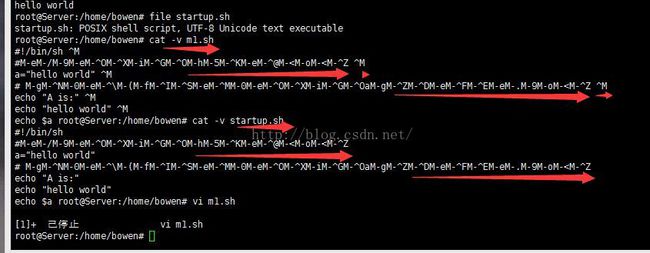- Bash 命令:系统操作的得力助手
阿贾克斯的黎明
运维bash开发语言
目录Bash命令:系统操作的得力助手目录操作命令文件操作命令文件查看命令在Linux系统的日常使用与运维工作中,Bash命令起着核心作用。它就像一把万能钥匙,能够开启系统各种功能的大门,让我们高效地管理和操作计算机资源。接下来,我们将详细介绍一些常用的Bash命令及其用法。目录操作命令ls(list):用于列出目录内容。例如,在终端输入ls,会显示当前目录下的文件和子目录。如果要查看详细信息,可以
- 2023全国职业院校技能大赛网络系统管理赛项(Linux部分真题)
Jackson~Y
linux运维服务器
一、Linux项目任务描述你作为一个Linux的技术工程师,被指派去构建一个公司的内部网络,要为员工提供便捷、安全稳定内外网络服务。你必须在规定的时间内完成要求的任务,并进行充分的测试,确保设备和应用正常运行。任务所有规划都基于Linux操作系统,请根据网络拓扑、基本配置信息和服务需求完成网络服务安装与测试,网络拓扑图和基本配置信息如下:(一)拓扑图(二)网络地址规划服务器和客户端基本配置如下表,
- k8s mysql数据目录挂载_【kubernetes】k8s数据卷,pod挂载本地路径
九罭之魚
k8smysql数据目录挂载
环境:Linux服务器配置挂载目录思路:在部署pod的节点(宿主机)配置同样的挂载路径到一个固定的服务器(目标服务器),这样不管pod在哪里跑,文件的保存路径都是不变的1.安装sshfsyuminstall-ysshfs2.添加ssh认证把节点的ssh公钥拷贝到目标服务器的~/.ssh/authorizedkeys中3.挂载目录在节点服务器执行:sshfsUSER@目标服务器IP:/path/to
- MySQL DCL数据控制语言
青花锁
mysql数据库DCL数据控制语言
作者主页:青花锁简介:Java领域优质创作者、Java微服务架构公号作者简历模板、学习资料、面试题库、技术互助文末获取联系方式往期热门专栏回顾专栏描述Java项目实战介绍Java组件安装、使用;手写框架等Aws服务器实战AwsLinux服务器上操作nginx、git、JDK、VueJava微服务实战Java微服务实战,SpringCloudNetflix套件、SpringCloudAlibaba套
- 处理解决运行前端脚手架工程报错: ‘vue-cli-service‘ 不是内部或外部命令,也不是可运行的程序 或批处理文件。附带 Linux
m0_74825746
前端vue.jslinux
目录一、场景介绍二、处理方式????1、?如果?package.json配置没有?vue-cli-server那么就安装它即可,注意安装完毕需重启编辑器启动项目,避免依赖添加不生效问题????2、如果package.json配置有?vue-cli-server或者安装了还是没好,可以看看node_modules工程模块是否存在,如果没有请安装。???3、如果上面两个条件都存在,却还是不行,那就是网
- Linux 操作一:系统调用:文件读写
余额不足12138
linux服务器
Linux操作一:系统调用:文件读写基本概念什么是文件简单的说,文件就是存储在硬件磁盘上的数据集合。文件通过什么来标识系统中在处理的文件(读、写操作)的时候,需要唯一能够识别这个文件,就需要一个针对文件的标识,以便在其它地方能识别出这个文件,于是就产生了文件描述符。文件描述符文件描述符是一些整数,简单的说就是一个文件ID,用于在系统中唯一的标识一个文件。文件描述符的总数也就是系统可以打开文件的最多
- Linux系统调用下的文件I/O编程
夏天又到了
LinuxC\C++编程技术linux服务器运维
【图书推荐】《LinuxC与C++一线开发实践(第2版)》_linuxc与c++一线开发实践pdf-CSDN博客LinuxC\C++编程技术_夏天又到了的博客-CSDN博客《LinuxC与C++一线开发实践(第2版)(Linux技术丛书)》(朱文伟,李建英)【摘要书评试读】-京东图书I/O就是输入/输出,它是主存和外部设备(比如硬盘、U盘)之间复制数据的过程,其中数据从设备到内存的过程称为输入,数
- 解决Docker服务注册到Eureka instanceId显示172.../以及Dockerfile和 docker-maven-plugin的简单使用
林纳斯_
dockerdocker微服务eureka172.
一、CentOS下安装DKcentos内核高于3.10:通过uname-r命令查看当前的内核版本移除旧版本:$sudoyumremovedocker\docker-client\docker-client-latest\docker-common\docker-latest\docker-latest-logrotate\docker-logrotate\docker-selinux\docker
- 【linux配置】配置文件设置静态IP方法
温柔如酒
linux配置文件linux服务器
1、配置文件说明1.1Ubuntu系统:修改文件vim/etc/netplan/01-netcfg.yamlnetwork:version:2ethernets:ens33:dhcp4:noaddresses:-192.168.1.100/24gateway4:192.168.1.1nameservers:addresses:-114.114.114.114-223.5.5.5应用配置:sudon
- 【linux性能优化】系统启动参数
温柔如酒
linux性能优化linux数据库运维
grubby-c/boot/grub2/grub.cfg--update-kernel=ALL--args=“raid=noautodetectswiotlb=16384crashkernel=16M,lowcrashkernel=512M,highmodprobe.blacklist=virtio_nettransparent_hugepage=neveracpi_force_table_ver
- Linux系统下DPDK源码编译,testpmd的使用以及编译过程中遇到的问题,以及高版本DPDK meson+ninja编译步骤
温柔如酒
DPDKlinux运维网络
一.dpdk-20.081.首先,下载以及编译依赖库安装:ubuntu:apt-getinstalllibnuma-devcentos:yuminstalllibnuma-devel以及yuminstallnumactl-devel官网下载DPDK源码,DPDK官网:dpdk.org以dpdk-20.08为例,下载完成后,cd到源码所在路径1.指定DPDK安装路径,设置所需的环境变量并转到源目录e
- 【linux命令】ip命令使用
温柔如酒
linux命令linuxtcp/ip网络
1、设置网口IP方法1:通过IP设置网口ip添加静态IP:ipaddradd1.1.1.1/24deveth0删除ip:ipaddrdel1.1.1.1/24deveth0方法2:nmtui配置IP另外方法:nmtui2、添加路由添加路由:iprouteadd目标网络地址/子网掩码via网关地址iprouteadd目标网络地址/子网掩码via网关地址dev网口名称eg:iprouteadd2.2.
- Python Sqlite数据库与配置文件的加载、编辑和保存
2201_75335496
数据库sqlitepythonjsonpyqt
一、Sqlite数据库SQLite,是一款轻型的数据库,是遵守ACID的关系型数据库管理系统,它包含在一个相对小的C库中。它是D.RichardHipp建立的公有领域项目。它的设计目标是嵌入式的,而且已经在很多嵌入式产品中使用了它,它占用资源非常的低,在嵌入式设备中,可能只需要几百K的内存就够了。它能够支持Windows/Linux/Unix等等主流的操作系统,同时能够跟很多程序语言相结合,比如T
- 使用vnstat监控网络流量和带宽占用
handsomestWei
运维运维网络
使用vnstat监控网络流量和带宽占用简介vnstat是个Linux下基于shell终端的网络流量监控工具,可帮助用户在不同时间段内监视,记录和查看网络统计信息。它提供了各种网络接口的汇总,允许用户以详细表或命令行统计视图的形式查看小时,每日,每月统计。安装sudoaptupdatesudoaptinstallvnstatsudosystemctlstartvnstatsudosystemctle
- hive表级权限控制_Hive权限管理
weixin_39769091
hive表级权限控制
最近遇到一个hive权限的问题,先简单记录一下,目前自己的理解不一定对,后续根据自己的理解程度更新一、hive用户的概念hive本身没有创建用户的命令,hive的用户就是Linux用户,若当前是用mr用户输入hive,进入hive的shell,则当前hive的用户为mr。hive本身不提供用户和用户的管理,只做权限控制。所以在实际的生产中,容易造成创表和使用表的用户不统一的情况,针对该情况可以使用
- HIVE的权限控制和超级管理员的实现
weixin_34364071
大数据数据库java
Hive用户权限管理从remote部署hive和mysql元数据表字典看,已经明确hive是通过存储在元数据中的信息来管理用户权限。现在重点是Hive怎么管理用户权限。首先要回答的是用户是怎么来的,发现hive有创建角色的命令,但没有创建用户的命令,显然Hive的用户不是在mysql中创建的。在回答这个问题之前,先初步了解下Hive的权限管理机制。Hive用户组和用户即Linux用户组和用户,和h
- Linux性能优化CPU篇之平均负载
linux
首先使用uptime命令查看对应平均负载.平均负载是指单位时间内,系统处于可运行状态和不可中断状态进程数所谓的可运行状态的进程是指,正在使用CPU或者正在等待的CPU进程数量,也就是我们常用的ps命令,处于R状态。不可中断状态的进程是正在处于内核关键流程中的进程,注意这些进程不可以被打断的,当我们向一个磁盘写入一个文件的时候,它是不可以被打断的。那么平均复杂怎么样才算好呢?平均负载最理想的情况是等
- Linux 系统性能调优
周盛欢
linux运维服务器
嘿,朋友们,今天咱们来唠唠Linux系统性能调优这事儿。你是不是觉得这听起来特高大上、特复杂?别担心,我保证用最简单的语言,让你这个0基础的小伙伴也能轻松入门。一、为啥要调优Linux性能想象一下,你的电脑突然变卡了,打开个软件都得等半天,是不是特别闹心?Linux系统也一样,用着用着可能会因为各种原因变慢。比如,服务器上用户越来越多,要是不调优,系统就可能扛不住,影响大家正常用。所以,性能调优就
- Centos7.6离线安装软件
PascalMing
LinuxCentosyumntp离线安装
在离线情况下,安装Centos软件,有几个方法1、直接下载离线软件包如果能直接下载离线软件包,是最省事的方法,可以直接baidu查找试试,或到下面这个网址试试:PackagesforLinuxandUnix-pkgs.orgUbuntu各版本的软件比较齐全,下载后直接安装即可由于Centos目前逐步停止支持,导致不少安装包不容易找到,可以试试第2种方法2、使用yum的离线包下载功能yum将一个包下
- 蓝易云 - Linux系统中常见的远程管理协议!
蓝易云
linux运维服务器httpnginxhttpsflutter
Linux系统中常见的远程管理协议有以下几种:1.SSH(SecureShell):SSH是一种安全的远程登录协议,用于在网络上安全地远程登录到Linux服务器。它提供了加密的传输和身份验证机制,可以防止数据在传输过程中被拦截和篡改。SSH使用用户名和密码或公钥认证来验证用户身份,并允许用户在远程终端上执行命令。2.Telnet:Telnet是一种不安全的远程登录协议,用于在网络上远程登录到Lin
- 【linux】看门狗&喂狗的简述
乔峰不是张无忌330
linux汽车电子linux汽车车载系统
看门狗的功能作用“看门狗定时器”,从功能上说它可以让微控制器在意外状况下(比如软件陷入死循环)重新回复到系统上电状态,以保证系统出问题的时候重启一次。“看门狗”就是一个计数器,由于位数有限计数器能够装的数值是有限的(比如8位的最多装256个数、16位的最多装65536个数),从开启“看门狗”那刻起,它就开始不停的数机器周期,数一个机器周期就计数器加1,加到计数器盛不下了(术语叫溢出)就就产生一个复
- 【VMware创建虚拟机+安装Ubuntu22】
2301_81475776
java服务器linux
使用VMware创建虚拟机并安装Ubuntu22创建虚拟机Ubuntu安装创建虚拟机1.打开下载好的VMware,点击主页中的"创建新的虚拟机“2.弹出窗口,选择“自定义”选项,点击下一步3.弹出窗口,选择所需要的”硬件兼容性“,点击下一步4.弹出窗口,选择”稍后安装操作系统“,点击下一步5.弹出窗口,客户机系统操作选择"Linux",版本选择“Ubuntu64”6.修改虚拟机名称7.选择虚拟
- ubuntu 22 安装vmware 17.5
bohu83
ubuntulinuxvmwarevmmonvmnet
因为玩小车,亚博售后说目前技术不支持搭建移植环境,推荐使用官方的虚拟机镜像。ubuntu安装linux,下载,推荐CDSRepository-/var/www/public/stage/session-120/cds/vmw-desktop/ws/17.5.1/23298084/linux/core官方网站brandcom注册很麻烦,貌似有bug,我注册完还提示登录失败。准备工作sudoaptin
- 从CentOS到龙蜥:企业级Linux迁移实践记录(龙蜥开局)
名为逗比
linuxcentos运维
引言:在我们之前的文章中,我们详细探讨了从CentOS迁移到龙蜥操作系统的基本过程和考虑因素。今天,我们将继续这个系列,重点关注龙蜥系统的实际应用——特别是常用软件的安装和配置。龙蜥操作系统(OpenAnolis)作为一个强大的企业级Linux发行版,不仅提供了稳定的基础环境,还支持广泛的软件生态系统。对于从CentOS迁移过来的用户来说,了解如何在龙蜥上安装和管理常用软件是确保平稳过渡的关键步骤
- MySQL备份案例: mysqldump+binlog实现完全+增量备份
糯米汤圆~
mysql数据库运维linux
一、素材准备1.创建一个干净环境的虚拟机--192.168.46.120openEuler22.linux在线安装MySQLa.查看本地MySQL安装列表,选择安装版本[root@openEuler~]#yumlist|grep-i"^mysql"mysql.src8.0.40-1.oe2203sp4update-sourcemysql.x86_648.0.40-1.oe2203sp4update
- keepalived 、HAProxy
www.农民工
智能路由器网络
KeepAlived高可用集群配置高可用的web集群监控本机80端口,实现主备切换实现原理实施配置高可用、负载均衡的web集群配置高可用、负载均衡HAProxy配置haproxy负载均衡调度器比较LVS(LinuxVirtualServer)NginxHAProxyday02KeepAlived高可用集群配置高可用的web集群监控本机80端口,实现主备切换实现原理实施配置高可用、负载均衡的web集
- Linux系统之配置Nginx负载均衡
江湖有缘
Linux技术学习linuxnginx负载均衡
Linux系统之配置Nginx负载均衡一、Nginx介绍1.1Nginx简介1.2Nginx反向代理1.3相关概念二、本次实践介绍2.1本次实践简介2.2本次实践环境规划三、部署两台web服务器3.1运行两个Docker容器3.2编辑测试文件四、配置负载均衡4.1安装nginx软件4.2编辑nginx配置文件4.3启动Nginx服务4.4检查Nginx服务状态4.5设置防火墙和selinux4.6
- 在Linux系统中无网络安装Nginx并配置负载均衡
LensonYuan
项目发布linux网络nginx
在Linux系统中无网络安装Nginx并配置负载均衡在现代的Web开发和运维中,Nginx作为一个高性能的HTTP和反向代理服务器,被广泛应用于负载均衡、静态资源服务、SSL终端等场景。然而,在某些特殊环境下,服务器可能无法访问互联网,这就需要在无网络的情况下手动安装和配置Nginx。本文将详细介绍如何在Linux系统中无网络安装Nginx,并通过Nginx实现负载均衡。1.环境准备在开始安装之前
- 【Rust】——不安全Rust
Y小夜
Rust(官方文档重点总结)rust开发语言后端
博主现有专栏:C51单片机(STC89C516),c语言,c++,离散数学,算法设计与分析,数据结构,Python,Java基础,MySQL,linux,基于HTML5的网页设计及应用,Rust(官方文档重点总结),jQuery,前端vue.js,Javaweb开发,Python机器学习等主页链接:Y小夜-CSDN博客目录不安全的超能力解引用裸指针调用不安全函数或方法创建不安全代码的安全抽象使用e
- 一文搞定postgreSQL
m0_74825172
java
一文搞定postgreSQLPostgreSQL全面指南一、什么是PostgreSQL?二、PostgreSQL的核心概念三、安装PostgreSQL1.在Linux上安装(例如Ubuntu)2.在macOS上安装(使用Homebrew)3.在Windows上安装四、基本操作1.启动和停止PostgreSQL服务2.连接到PostgreSQL3.创建数据库和用户4.基本SQL操作五、高级功能1.事
- 深入浅出Java Annotation(元注解和自定义注解)
Josh_Persistence
Java Annotation元注解自定义注解
一、基本概述
Annontation是Java5开始引入的新特征。中文名称一般叫注解。它提供了一种安全的类似注释的机制,用来将任何的信息或元数据(metadata)与程序元素(类、方法、成员变量等)进行关联。
更通俗的意思是为程序的元素(类、方法、成员变量)加上更直观更明了的说明,这些说明信息是与程序的业务逻辑无关,并且是供指定的工具或
- mysql优化特定类型的查询
annan211
java工作mysql
本节所介绍的查询优化的技巧都是和特定版本相关的,所以对于未来mysql的版本未必适用。
1 优化count查询
对于count这个函数的网上的大部分资料都是错误的或者是理解的都是一知半解的。在做优化之前我们先来看看
真正的count()函数的作用到底是什么。
count()是一个特殊的函数,有两种非常不同的作用,他可以统计某个列值的数量,也可以统计行数。
在统
- MAC下安装多版本JDK和切换几种方式
棋子chessman
jdk
环境:
MAC AIR,OS X 10.10,64位
历史:
过去 Mac 上的 Java 都是由 Apple 自己提供,只支持到 Java 6,并且OS X 10.7 开始系统并不自带(而是可选安装)(原自带的是1.6)。
后来 Apple 加入 OpenJDK 继续支持 Java 6,而 Java 7 将由 Oracle 负责提供。
在终端中输入jav
- javaScript (1)
Array_06
JavaScriptjava浏览器
JavaScript
1、运算符
运算符就是完成操作的一系列符号,它有七类: 赋值运算符(=,+=,-=,*=,/=,%=,<<=,>>=,|=,&=)、算术运算符(+,-,*,/,++,--,%)、比较运算符(>,<,<=,>=,==,===,!=,!==)、逻辑运算符(||,&&,!)、条件运算(?:)、位
- 国内顶级代码分享网站
袁潇含
javajdkoracle.netPHP
现在国内很多开源网站感觉都是为了利益而做的
当然利益是肯定的,否则谁也不会免费的去做网站
&
- Elasticsearch、MongoDB和Hadoop比较
随意而生
mongodbhadoop搜索引擎
IT界在过去几年中出现了一个有趣的现象。很多新的技术出现并立即拥抱了“大数据”。稍微老一点的技术也会将大数据添进自己的特性,避免落大部队太远,我们看到了不同技术之间的边际的模糊化。假如你有诸如Elasticsearch或者Solr这样的搜索引擎,它们存储着JSON文档,MongoDB存着JSON文档,或者一堆JSON文档存放在一个Hadoop集群的HDFS中。你可以使用这三种配
- mac os 系统科研软件总结
张亚雄
mac os
1.1 Microsoft Office for Mac 2011
大客户版,自行搜索。
1.2 Latex (MacTex):
系统环境:https://tug.org/mactex/
&nb
- Maven实战(四)生命周期
AdyZhang
maven
1. 三套生命周期 Maven拥有三套相互独立的生命周期,它们分别为clean,default和site。 每个生命周期包含一些阶段,这些阶段是有顺序的,并且后面的阶段依赖于前面的阶段,用户和Maven最直接的交互方式就是调用这些生命周期阶段。 以clean生命周期为例,它包含的阶段有pre-clean, clean 和 post
- Linux下Jenkins迁移
aijuans
Jenkins
1. 将Jenkins程序目录copy过去 源程序在/export/data/tomcatRoot/ofctest-jenkins.jd.com下面 tar -cvzf jenkins.tar.gz ofctest-jenkins.jd.com &
- request.getInputStream()只能获取一次的问题
ayaoxinchao
requestInputstream
问题:在使用HTTP协议实现应用间接口通信时,服务端读取客户端请求过来的数据,会用到request.getInputStream(),第一次读取的时候可以读取到数据,但是接下来的读取操作都读取不到数据
原因: 1. 一个InputStream对象在被读取完成后,将无法被再次读取,始终返回-1; 2. InputStream并没有实现reset方法(可以重
- 数据库SQL优化大总结之 百万级数据库优化方案
BigBird2012
SQL优化
网上关于SQL优化的教程很多,但是比较杂乱。近日有空整理了一下,写出来跟大家分享一下,其中有错误和不足的地方,还请大家纠正补充。
这篇文章我花费了大量的时间查找资料、修改、排版,希望大家阅读之后,感觉好的话推荐给更多的人,让更多的人看到、纠正以及补充。
1.对查询进行优化,要尽量避免全表扫描,首先应考虑在 where 及 order by 涉及的列上建立索引。
2.应尽量避免在 where
- jsonObject的使用
bijian1013
javajson
在项目中难免会用java处理json格式的数据,因此封装了一个JSONUtil工具类。
JSONUtil.java
package com.bijian.json.study;
import java.util.ArrayList;
import java.util.Date;
import java.util.HashMap;
- [Zookeeper学习笔记之六]Zookeeper源代码分析之Zookeeper.WatchRegistration
bit1129
zookeeper
Zookeeper类是Zookeeper提供给用户访问Zookeeper service的主要API,它包含了如下几个内部类
首先分析它的内部类,从WatchRegistration开始,为指定的znode path注册一个Watcher,
/**
* Register a watcher for a particular p
- 【Scala十三】Scala核心七:部分应用函数
bit1129
scala
何为部分应用函数?
Partially applied function: A function that’s used in an expression and that misses some of its arguments.For instance, if function f has type Int => Int => Int, then f and f(1) are p
- Tomcat Error listenerStart 终极大法
ronin47
tomcat
Tomcat报的错太含糊了,什么错都没报出来,只提示了Error listenerStart。为了调试,我们要获得更详细的日志。可以在WEB-INF/classes目录下新建一个文件叫logging.properties,内容如下
Java代码
handlers = org.apache.juli.FileHandler, java.util.logging.ConsoleHa
- 不用加减符号实现加减法
BrokenDreams
实现
今天有群友发了一个问题,要求不用加减符号(包括负号)来实现加减法。
分析一下,先看最简单的情况,假设1+1,按二进制算的话结果是10,可以看到从右往左的第一位变为0,第二位由于进位变为1。
- 读《研磨设计模式》-代码笔记-状态模式-State
bylijinnan
java设计模式
声明: 本文只为方便我个人查阅和理解,详细的分析以及源代码请移步 原作者的博客http://chjavach.iteye.com/
/*
当一个对象的内在状态改变时允许改变其行为,这个对象看起来像是改变了其类
状态模式主要解决的是当控制一个对象状态的条件表达式过于复杂时的情况
把状态的判断逻辑转移到表示不同状态的一系列类中,可以把复杂的判断逻辑简化
如果在
- CUDA程序block和thread超出硬件允许值时的异常
cherishLC
CUDA
调用CUDA的核函数时指定block 和 thread大小,该大小可以是dim3类型的(三维数组),只用一维时可以是usigned int型的。
以下程序验证了当block或thread大小超出硬件允许值时会产生异常!!!GPU根本不会执行运算!!!
所以验证结果的正确性很重要!!!
在VS中创建CUDA项目会有一个模板,里面有更详细的状态验证。
以下程序在K5000GPU上跑的。
- 诡异的超长时间GC问题定位
chenchao051
jvmcmsGChbaseswap
HBase的GC策略采用PawNew+CMS, 这是大众化的配置,ParNew经常会出现停顿时间特别长的情况,有时候甚至长到令人发指的地步,例如请看如下日志:
2012-10-17T05:54:54.293+0800: 739594.224: [GC 739606.508: [ParNew: 996800K->110720K(996800K), 178.8826900 secs] 3700
- maven环境快速搭建
daizj
安装mavne环境配置
一 下载maven
安装maven之前,要先安装jdk及配置JAVA_HOME环境变量。这个安装和配置java环境不用多说。
maven下载地址:http://maven.apache.org/download.html,目前最新的是这个apache-maven-3.2.5-bin.zip,然后解压在任意位置,最好地址中不要带中文字符,这个做java 的都知道,地址中出现中文会出现很多
- PHP网站安全,避免PHP网站受到攻击的方法
dcj3sjt126com
PHP
对于PHP网站安全主要存在这样几种攻击方式:1、命令注入(Command Injection)2、eval注入(Eval Injection)3、客户端脚本攻击(Script Insertion)4、跨网站脚本攻击(Cross Site Scripting, XSS)5、SQL注入攻击(SQL injection)6、跨网站请求伪造攻击(Cross Site Request Forgerie
- yii中给CGridView设置默认的排序根据时间倒序的方法
dcj3sjt126com
GridView
public function searchWithRelated() {
$criteria = new CDbCriteria;
$criteria->together = true; //without th
- Java集合对象和数组对象的转换
dyy_gusi
java集合
在开发中,我们经常需要将集合对象(List,Set)转换为数组对象,或者将数组对象转换为集合对象。Java提供了相互转换的工具,但是我们使用的时候需要注意,不能乱用滥用。
1、数组对象转换为集合对象
最暴力的方式是new一个集合对象,然后遍历数组,依次将数组中的元素放入到新的集合中,但是这样做显然过
- nginx同一主机部署多个应用
geeksun
nginx
近日有一需求,需要在一台主机上用nginx部署2个php应用,分别是wordpress和wiki,探索了半天,终于部署好了,下面把过程记录下来。
1. 在nginx下创建vhosts目录,用以放置vhost文件。
mkdir vhosts
2. 修改nginx.conf的配置, 在http节点增加下面内容设置,用来包含vhosts里的配置文件
#
- ubuntu添加admin权限的用户账号
hongtoushizi
ubuntuuseradd
ubuntu创建账号的方式通常用到两种:useradd 和adduser . 本人尝试了useradd方法,步骤如下:
1:useradd
使用useradd时,如果后面不加任何参数的话,如:sudo useradd sysadm 创建出来的用户将是默认的三无用户:无home directory ,无密码,无系统shell。
顾应该如下操作:
- 第五章 常用Lua开发库2-JSON库、编码转换、字符串处理
jinnianshilongnian
nginxlua
JSON库
在进行数据传输时JSON格式目前应用广泛,因此从Lua对象与JSON字符串之间相互转换是一个非常常见的功能;目前Lua也有几个JSON库,本人用过cjson、dkjson。其中cjson的语法严格(比如unicode \u0020\u7eaf),要求符合规范否则会解析失败(如\u002),而dkjson相对宽松,当然也可以通过修改cjson的源码来完成
- Spring定时器配置的两种实现方式OpenSymphony Quartz和java Timer详解
yaerfeng1989
timerquartz定时器
原创整理不易,转载请注明出处:Spring定时器配置的两种实现方式OpenSymphony Quartz和java Timer详解
代码下载地址:http://www.zuidaima.com/share/1772648445103104.htm
有两种流行Spring定时器配置:Java的Timer类和OpenSymphony的Quartz。
1.Java Timer定时
首先继承jav
- Linux下df与du两个命令的差别?
pda158
linux
一、df显示文件系统的使用情况,与du比較,就是更全盘化。 最经常使用的就是 df -T,显示文件系统的使用情况并显示文件系统的类型。 举比例如以下: [root@localhost ~]# df -T Filesystem Type &n
- [转]SQLite的工具类 ---- 通过反射把Cursor封装到VO对象
ctfzh
VOandroidsqlite反射Cursor
在写DAO层时,觉得从Cursor里一个一个的取出字段值再装到VO(值对象)里太麻烦了,就写了一个工具类,用到了反射,可以把查询记录的值装到对应的VO里,也可以生成该VO的List。
使用时需要注意:
考虑到Android的性能问题,VO没有使用Setter和Getter,而是直接用public的属性。
表中的字段名需要和VO的属性名一样,要是不一样就得在查询的SQL中
- 该学习笔记用到的Employee表
vipbooks
oraclesql工作
这是我在学习Oracle是用到的Employee表,在该笔记中用到的就是这张表,大家可以用它来学习和练习。
drop table Employee;
-- 员工信息表
create table Employee(
-- 员工编号
EmpNo number(3) primary key,
-- 姓

